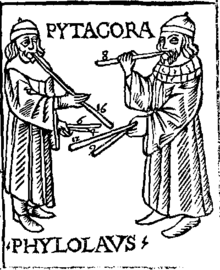In my last post, I mentioned a talk I will be giving at the University of Toronto’s Collaborative Programme in Ancient and Medieval Philosophy on April 8. I’m under water this week, so I thought I’d put up a preview of that talk:
The significance of the verb ὑπάρχειν and its cognates cannot be overstated for Aristotle: it plays a central role in his unique approaches to metaphysics and logic. But the very appearance of such distinctive conceptual applications begs the question: against what background does Aristotle develop his peculiar usage of ὑπάρχειν? This presentation aims to answer that question by developing a history of metaphysical applications of the term ὑπάρχειν among Presocratic intellectuals, notably Philolaus of Croton, Democritus of Abdera, and Epicharmus of Cos. Such an investigation reveals a pre-disciplinary “mathematical” use of ὑπάρχειν that helps us to contextualize this concept’s application in Aristotle’s works.

Aristotle’s criticism of the Philolaus chiefly concerns two related aspects of Philolaus’ philosophy: his collapse of intelligibles into sensibles, and his imprecise approach to definition (Metaph. I.5, 987a10-29). Of the former aspect, with which this presentation will concern itself, Aristotle (Metaph. I.5, 986b8-9) complains that Philolaus “says that being was constituted and fashioned out of the underlying things” (ἐκ…ἐνυπαρχόντων συνεστάναι καὶ πεπλάσθαι φασὶ τὴν οὐσίαν). Although direct relationships between Philolaus’ speculation about preexistence and Aristotle’s own project of first philosophy have been denied (Nussbaum 1979: 101), textual evidence suggests that Aristotle had Philolaus’ book in hand when he was writing the Metaphysica: in Fragment 6, Philolaus claims that “the being of things” (ἁ μὲν ἐστὼ τῶν πραγμάτων) and the “origins” (ταὶ ἀρχαί: limiters and unlimiteds) from which the entire cosmos was “constituted” (συνέστα) “preexisted” (ὑπᾶρχον). What does Philolaus mean by these obscure statements? Interpretation of Fragment 6 of Philolaus cannot be inferred simply from Aristotle – who had his own axe to grind – and requires a broader contextualization with early Greek philosophical thinkers, both contemporaries and predecessors.
Despite a continuous non-technical usage of ὑπάρχειν from Homer through the Greek Tragedians, the 6th and 5th Century Presocratics who concerned themselves with natural philosophy, cosmology, and ontology (e.g. Parmenides, Anaxagoras, Melissus) never employ ὑπάρχειν and its cognates. Indeed, that term only appears among the surviving fragments of the Presocratics twice: in the longest surviving fragment of Democritus, and in a fragment of Epicharmus of Cos. Democritus’ links to Pythagoreanism appear in the lost writings of his younger contemporary, the 5th Century BCE musician and historian Glaucus of Rhegium (Diogenes Laertius IX.38). Yet the relevant fragment of Democritus (DK 68 B 191) demonstrates a non-philosophical usage of ὑπάρχειν which is more in line with formulaic appearances of those terms by Thucydides and the orator Antiphon of Rhamnus, in which ὑπάρχειν-words are contrasted with words related to παρεἶναι. Democritus thus plays a negative role in our investigation into Philolaic preexistence. But a fragment of Epicharmus (fl. early 5th Century BCE), whose philosophical importance has recently been emphasized by Stephen Menn (2010: 43-47), requires further analysis.
One fragment of Epicharmus (DK 23 B 2 = F 276 Kassel-Austin) presents a figure who parodies what we might call ‘Heraclitean’ arguments by comparing the addition of pebbles to piles with the changes that occur when someone grows older (cf. Cassio 1985: 43-45 and Burkert 1972: 438 n. 64). If the addition of the pebble changes the ‘number’ of the pile, does the growth of a person change his substance? Jokes aside, the language of underlying numerical value (described in ὑπάρχειν-terms) gives us a sense of how Philolaus and other Pythagoreans could have understood preexistence as a potentially progressive state of mathematical order, especially the sorts of order one might see in a continued proportion. This “mathematical” conceptualization of ὑπάρχειν also survives in simpler proofs of Euclid (e.g. Elementa IX.11) and stimulates us to consider Aristotle’s departure from “mathematical” uses of ὑπάρχειν. It also forces us to rethink the meaning of Philolaus’ Fragment 6, especially with regard to how Philolaus’ concept of the “being of things” is informed by the language of arithmetic as presented in Epicharmus’ Fragment 2.
Bibliography
Burkert, W. (1972) Lore and Science in Ancient Pythagoreanism, tr. Edwin L. Minar, Jr. (Cambridge, MA).
Cassio, A.C. (1985) “Two Studies on Epicharmus and His Influence”, HSCP 89: 37-52.
Menn, S. (2010) “On Socrates’ First Objections to the Physicists (Phaedo 95e8-97b7).” OSAP 38: 37-68.
Nussbaum, M.C. (1979) “Eleatic Conventionalism and Philolaus on the Condition of Thought”, HSCP 83: 63-108.
